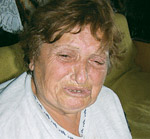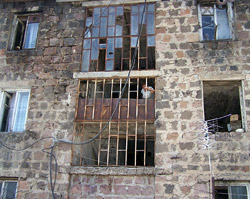All the prisoners of Armenia would barely adapt to living in the “Dark Prison” of Charentsavan settlement. Living in this settlement is already like committing suicide. The building in the photo is the former “Dark Colony” building of Charentsavan in the Kotayk Marz.
Although keeping people in prisons is a means of discipline, however the people living in the “Dark Prison” are condemned without committing a crime. The only thing you can see behind the bars of the windows is darkness.
The “Dark Prison” of the Charentsavan settlement was originally built for prisoners who were moved there for the construction of other buildings.
For the past 16-17 years, 12 homeless families have settled down in “Dark Prison”. They had their freedom taken away from them from the start because the building was built for that purpose. The people living there aren’t prisoners, but the dark walls of the cells create that kind of atmosphere.
 There is no sewer, bathroom, shower or kitchen in the building. The 12 families living in one building use the wooden public restroom located 15-20 kilometers away. The children say that they are afraid to enter the bathroom because the wooden cover is crooked and may fall on them some day. The residents say that in contrast to Armenians, foreign organizations sometimes pay attention to them. There really is a lot to interest foreigners here. They come here, film documentaries about the “Dark Prison” residents’ lives and amaze foreigners with the fact that there is a country called Armenia, which was the first to adopt Christianity as a state religion, whose economy rises each year, where many elite buildings are built, yet the people don’t live in those buildings, but rather a building for prisoners called “Dark Prison”.
There is no sewer, bathroom, shower or kitchen in the building. The 12 families living in one building use the wooden public restroom located 15-20 kilometers away. The children say that they are afraid to enter the bathroom because the wooden cover is crooked and may fall on them some day. The residents say that in contrast to Armenians, foreign organizations sometimes pay attention to them. There really is a lot to interest foreigners here. They come here, film documentaries about the “Dark Prison” residents’ lives and amaze foreigners with the fact that there is a country called Armenia, which was the first to adopt Christianity as a state religion, whose economy rises each year, where many elite buildings are built, yet the people don’t live in those buildings, but rather a building for prisoners called “Dark Prison”.
Czech film directors have filmed a movie about the residents of “Dark Prison” and amazed viewers by saying that even a dog would have died there. The “Dark Prison” is really a great topic to film because you can rarely find anyone living in such inhumane conditions.
“I take out shoes and clothes from the garbage”
A woman calls from the third floor.
“Please, come up here. I can’t come down because I am ill. Come and see how we live. Please, come up here for one minute.”
I go up and as I climb the stairs in darkness, I fear that the doors will close behind me. There are cells on all floors and cats in front of all the doors. I climb with my hands on some floors simply because there are no stairs. There are a total of 48 cells in the building.
 No prisoner would want to stay in the cell of sixty-year old Seda Khatoyan. It’s pathetic and melancholic. Seda is sixty years old and her husband Norik can’t even talk. He’s tired…
No prisoner would want to stay in the cell of sixty-year old Seda Khatoyan. It’s pathetic and melancholic. Seda is sixty years old and her husband Norik can’t even talk. He’s tired…
They’re refugees who are temporarily living in the “Dark Prison” until a new building is constructed nearby. This is what they were told and they have been waiting for 16 years. They adapted with the hope that the state would provide them with a place to call home. Seda and her husband say that they have tuberculosis from the humidity of the cell. They whisper because they don’t want their neighbors to hear and the news to spread to the children. After all, tuberculosis can be contracted.
“I get 5000 AMD (10 dollars) pension for my first-degree illness and 7000 AMD (15 dollars) subsidy. My lungs and kidneys are deteriorated. I have gotten all kinds of illnesses from the humidity. I can’t move my legs,” says Seda whose walls have been destroyed from the rain.
The rain and snow falling on the three floors make it all the way to the first floor. The residents collected everyone’s pensions, bought a huge bag to cover the roof, but that didn’t help. Sometimes they can’t even pay the electricity bill and are forced to live in darkness. The dark days spent in the cells drive the residents crazy. I ask Seda:
“How do you live on 12,000 AMD (15-17 dollars) a month?”
My question makes them angry.
“Do you really want to know?…I ask people for food. I find a shoe in the garbage, bring it home, sew it and wear it. One day I will be choleric. I find clothes in the garbage too. Now do you know how we live?” says Seda.
She is amazed to see that a first-degree sick woman like her only gets 5,000 AMD monthly.
“How can the first-degree patient cure himself with that much money?”
The neighbors, who know how Seda and her husband live, say that Seda can’t even go down the stairs to go to the wooden restroom. Their cell is a kitchen, bedroom, bathroom and living room in one.
“If I need to go the bathroom, I go at home. Do you realize how I live? I can’t take this anymore.”
I’m dying
 Norik is tired and doesn’t have any energy, but he managed to tell me how they treated him in the hospital.
Norik is tired and doesn’t have any energy, but he managed to tell me how they treated him in the hospital.
Recently, he got really sick and started to wheeze. He went to the Charentsavan hospital so the doctors could help him.
“They told me I had to pay 10,000 AMD (20 dollars) for them to check-up on me for one night. If I don’t even have money to pay for food, I’m hungry and I wheeze, how can I pay 10,000 AMD to lie in a hospital bed?”
The old man didn’t receive any help from the doctors and it took him three hours to get to his house due to his illness. He got a loan from some of his friends and his neighbors injected some tranquilizers. Armine, his neighbor, kept interrupting Norik while he was talking. She didn’t want him to tell me how badly they treated Norik at the hospital and tried changing the subject. When Seda told me that Armine works as a nurse at the hospital, I understood why she did that. Armine didn’t want Norik to tell about the fees at the hospital because she is a nurse and her cell is better than Norik’s. She has managed to tidy up her cell and feed her three children. Norik’s story may get her fired from the hospital.
“We are su-ffer-ing,” says the old man.
 We don’t get the contributions
We don’t get the contributions
Armine Serobyan and her husband have been living in the “Dark Prison” with their three children for the past 15 years. Armine was born in Charentsavan, got married in Stepenavan and came to Charentsavan after the earthquake of 1988. She had signed up to get an apartment. They came to “Dark Prison” for two months until it would be her turn to get an apartment, but they don’t have anything to this day. She says that all foreigners have come to Charentsavan to make films about them.
“They’ve come from all countries, you name it: Australia, France, the Czech Republic. They are surprised when they see how we live. The charity fund says that they send their contributions, but we haven’t received anything yet.”
Armine says that the “people” here “make the money theirs” and don’t give any money sent from abroad.
“They give us a little money, but we go hungry”
 Shushanik Amyan and Armine Yeghinyan took refuge in Charentsavan in 1988 after escaping from Baku. They are over 80 years old. They have turned their backs to the sun because their “Dark Prison” cell is humid. I ask them how they are doing and they say in irony.
Shushanik Amyan and Armine Yeghinyan took refuge in Charentsavan in 1988 after escaping from Baku. They are over 80 years old. They have turned their backs to the sun because their “Dark Prison” cell is humid. I ask them how they are doing and they say in irony.
“Excellent”.
She asks me:
“Is there any news? Have they increased our pensions?”
“They give us little money, but we go hungry. I can’t show you my cell because I can’t move. There’s one heater, a bed and a small mattress,” says Grandmother Shushan pointing her finger at the wooden public restroom.
“By the time I get there with this wooden cane, I die. This cane helps me a lot,” says Shushan.
She says that they have no water or electricity. Armine lives with her son. She says that her son is psychologically ill and that she can’t go back to Karabakh because of that.
“Sometimes I take him to the hospital. What can I do if I take him to Karabakh? He came sick from the army. They had beat him on the head. Help us get out of this situation, please. We have been living in “Dark Prison” for the past 16 years.”
The children growing up in “Dark Prison” say that they were so happy when President Robert Kocharyan came to Charentsavan, that they hung balloons from the windows of their cells thinking that he would come to see them. Alas, Kocharyan didn’t stop at “Dark Prison”. Perhaps there wasn’t any laundry hanging from the windows at the time and it didn’t cross Robert Kocharyan’s mind that there could be people living in that building.

